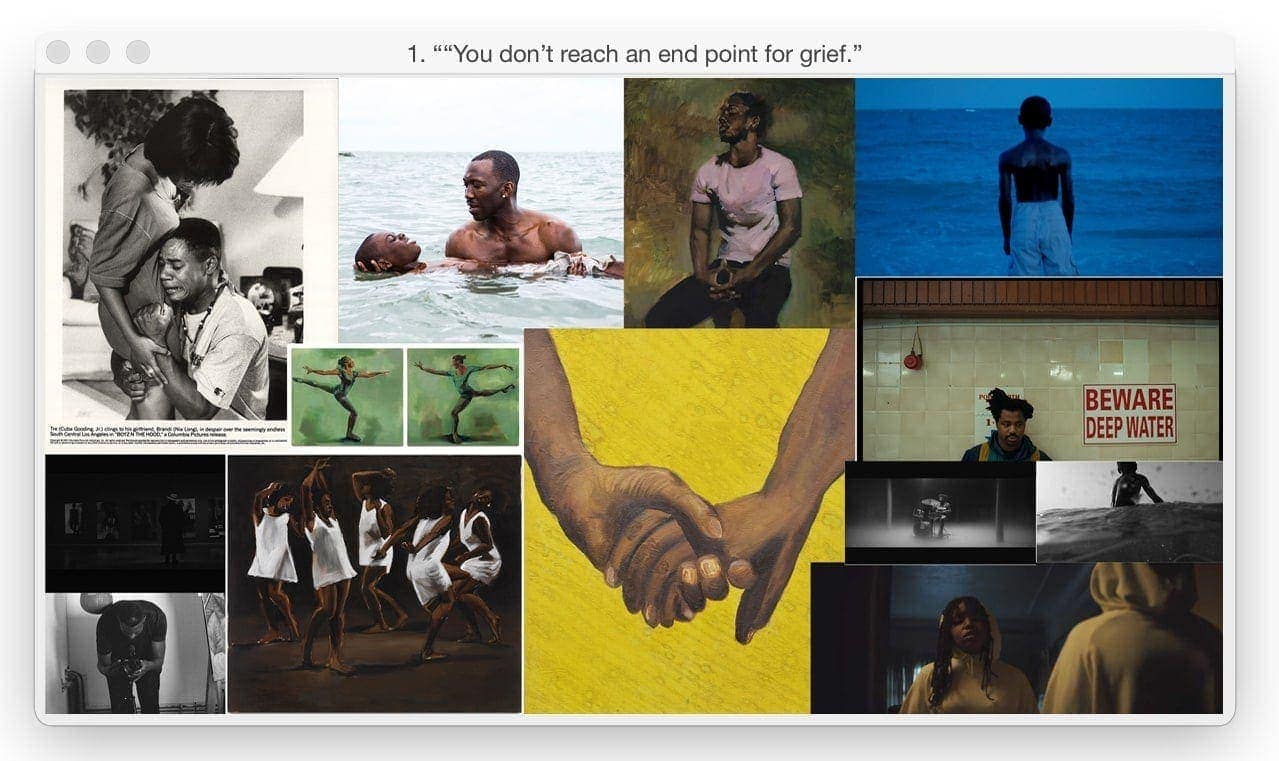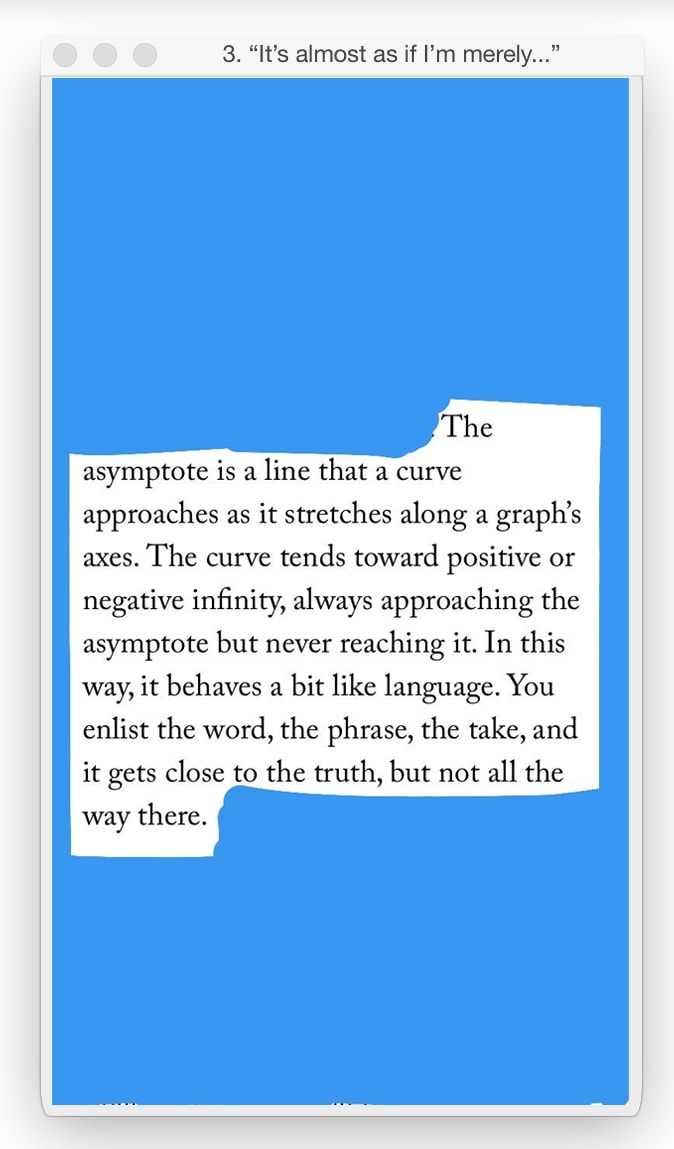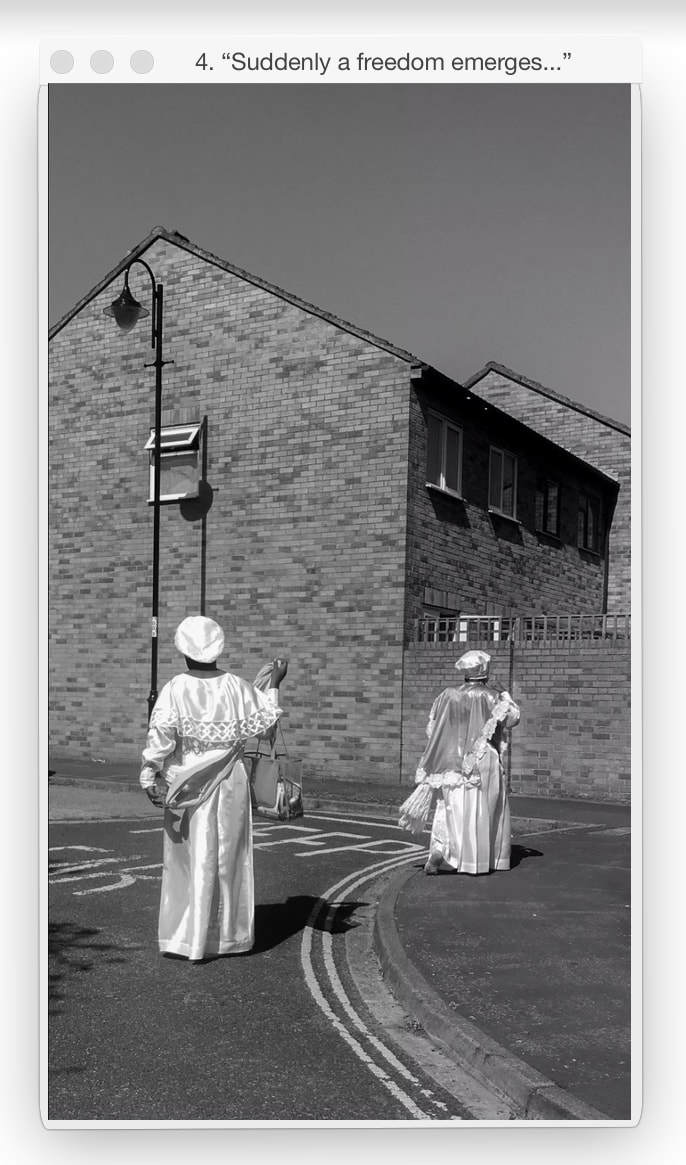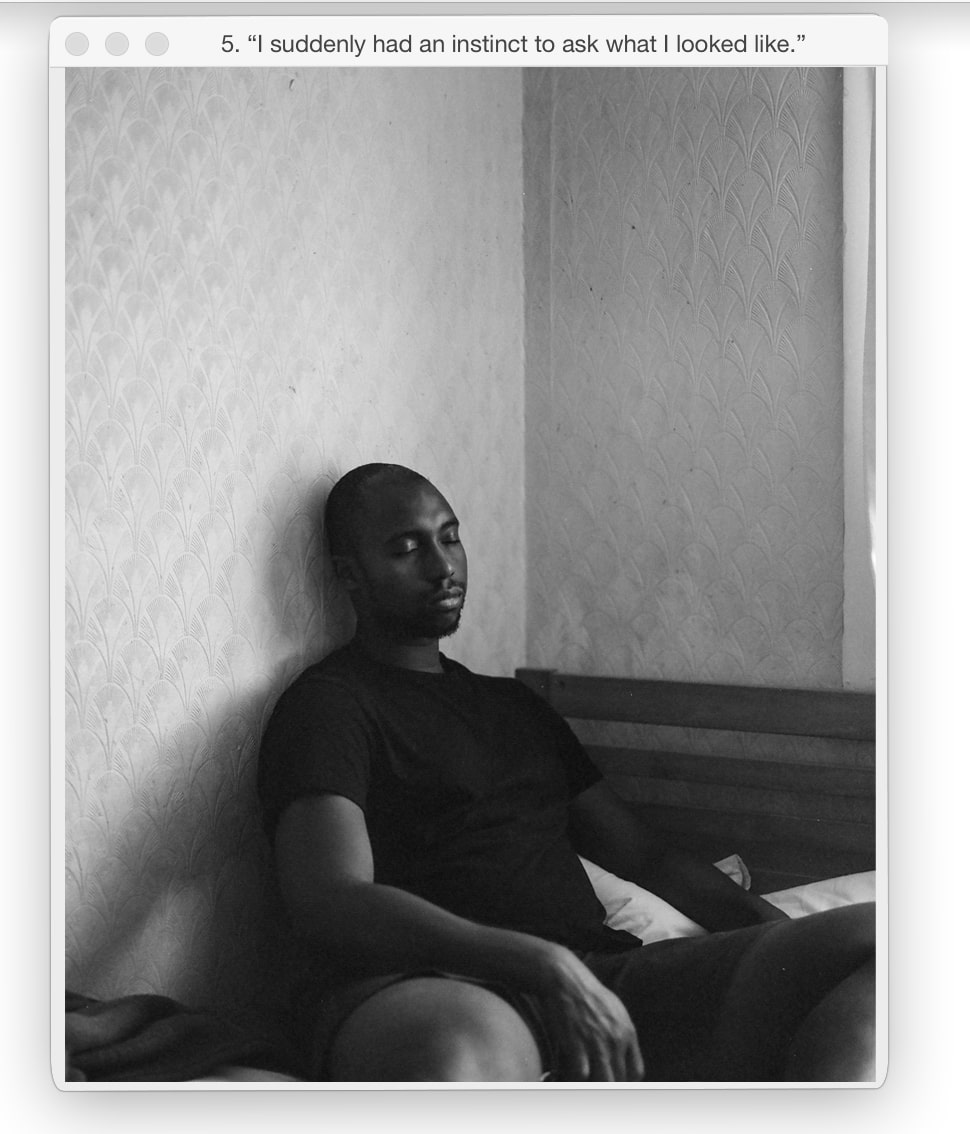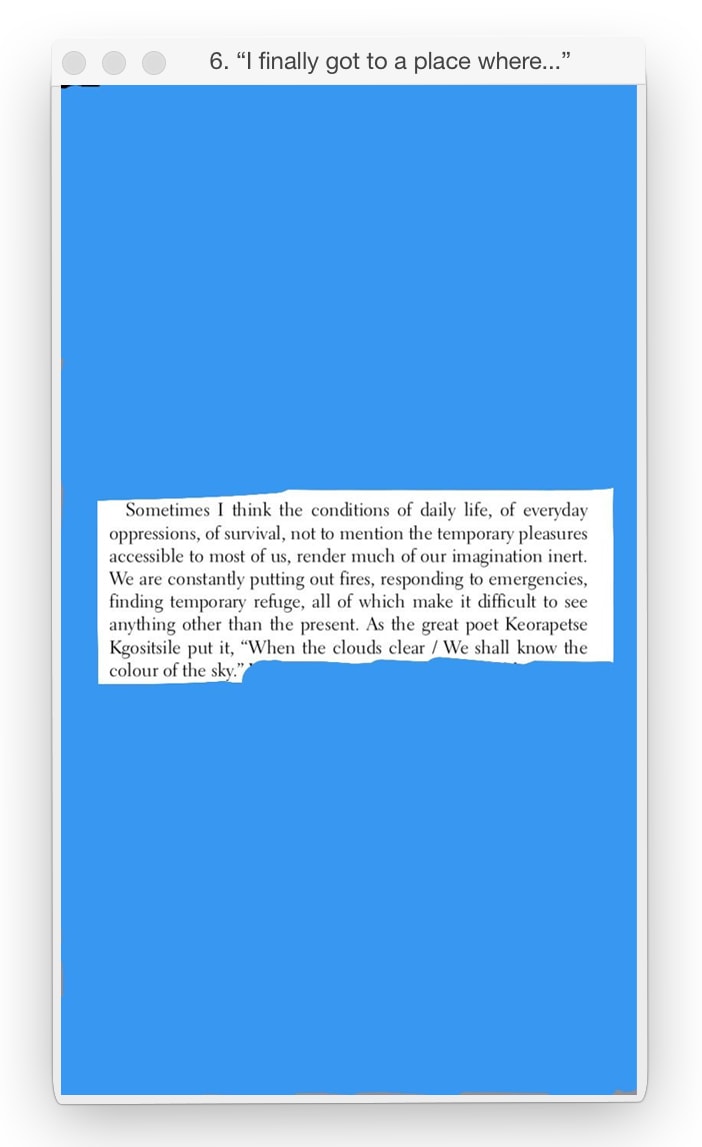Miscellaneous Files is a series of virtual studio visits that uses writers’ digital artifacts to understand their practice. Conceived by Mary Wang, each interview provides an intimate look into the artistic process.
Caleb Azumah Nelson’s debut novel, Open Water, unfolds like a sequence of pulsating sensations. When the narrator, a photographer, is introduced to a dancer in a London pub, they are both so impressed with each other that their initial exchange elicits a nervous flapping of arms instead of a customary handshake or embrace. They fall carefully, hopefully in love, their increased intimacy communicated through the swipe of a hand or the smell of a borrowed hoodie. Their romance grows against a backdrop of Black art, music, cinema, and literature, a cultural tapestry that offers these young artists protection against a world where being seen and heard is a fight. The recognition that this fight is not often settled in their favor fuels the novel’s secondary narrative, in which we see the photographer—a young Black man coming of age in a European capital filled with police violence, class antagonism, and cultural erasure—question how he can live, let alone love. “You wondered if you were wrong,” Azumah Nelson writes, taking us inside his character’s head. “If freedom isn’t as full as you imagine—no, if freedom is not an absolute—no, try again—if freedom is something one could always feel. Or if you are destined to feel it in small moments here and there.”
Reading Azumah Nelson is an experience that has been described as a “kind of synesthesia.” Open Water’s narrative moves like jazz, punctured with loops, diversions, and improvisation. The characters’ relationship is sketched through a series of images that emerge as quickly as they fade, as if tied to a rolling film reel. The London-based Ghanaian writer has always been omnivorous in his modes of expression—from playing violin and basketball growing up to writing and photographing today. But there is one question he seems to return to, in his work as well as our conversation: In a world filled with violence and grief, how can one create the freedom to love—the freedom to just be?
I spoke to Azumah Nelson in March, a few weeks after Open Water was published in the UK. The growing myth around this work—it was written in a few summer months in 2019, the object of a nine-way bidding war, and soon landed its author on various most-anticipated lists—has only become stronger since the novel’s release stateside. Together, we explored the artistic influences that make up Azumah Nelson’s world—a world that seems only to be expanding.
1. “You don’t reach an end point for grief.”
Mary Wang: At what point in the writing process did you make this mood board?
Caleb Azumah Nelson: I wrote the core draft of Open Water in a space of two or three months. During my research, I amassed quite a large collection of images, videos, texts, and sound. Every week, I would revisit what I’d gone through and select what resonated the most. These were the first images I knew would make their way into the narrative.
I’m always collating and collaging, trying to see how images work off one another. I discovered that if I referenced images or films in Open Water, it would take the narrative into another dimension. It’s like sampling music—like J Dilla or Madlib—you’re not just sampling a specific sound, but you’re sampling what was in the room at a specific time.
When you sample in music, you’re taking a snippet, a phrase and repurpose it into something else, a new melody or drum pattern. With images, I was interested in feelings, emotions, the gaze—the gaze, especially, of how Black people were seeing and being seen. I was interested in the possibilities that could emerge from a single moment.
Wang: The novel started as a series of non-fiction essays. At your agent’s encouragement, you started putting them together as a novel. How did a story emerge from the sounds and images you had collected?
Azumah Nelson: They were originally short, lyric essays about photography, music, film, and about Blackness and freedom. They were a testing ground—quite a few were written in second-person, the form I eventually used in the novel. I wanted to first explore the feelings I was interested in, and write the fictional events outwards from there.
Wang: When did it become a love story?
Azumah Nelson: The book contains many different love stories: There’s the love between the pair, but there’s also an ode to creative expression, specifically Black creative expression, and there’s the love for South East London, where the narrator is from. In a sense, this was a work of love about all the things that I love and have loved, an exploration of what freedom can be afforded to you when you love someone or something.
What freedom can be found in the safety of love? In places where you can be honest, can be true, can be yourself? That’s the freedom I was interested in: sitting alongside someone you love, or being in a place you love, and not feeling like you have to hide. Rather than the everyday violence you might encounter when you look like me, you’re greeted by love and care. That in itself is freeing.
Wang: It’s as if you used the conventions of a love story—which usually unfolds between two people who are romantically interested in each other—to give language to other forms of love, forms that are perhaps harder to describe. Like the love for grandparents, which can differ wildly across families and cultures.
Azumah Nelson: As much as the story was about love, it was also about loss. I grew up with my maternal grandmother for the first six years of my life. In essence, she was another parent. She specifically moved from Ghana to London to be with me, so there was something very intentional about the love she was sharing. We maintained a connection even after she returned to Ghana. She was someone who always called me on my birthday to sing for me. When she left this plane, I felt a real loss, because that intention wasn’t there anymore.
I wanted to think about the loss of love, the corners of grief, and how they’re constantly developing and growing. You don’t reach an end point for grief, but there are nuances to what your grief looks like at different moments. For me, today, it’s the ability to talk to you about this experience. That wouldn’t have been possible three years ago, when the grief was too overwhelming.
Wang: For many immigrants, the loss of a grandparent also signifies the loss of a specific connection to the homeland.
Azumah Nelson: I’m in a strange limbo: I was planning to go to Ghana last year, which didn’t happen because of the pandemic. The last time I went was fifteen years ago, for my grandma’s 80th birthday. Ghana doesn’t so much represent a home for me but a way of seeing the world. When I look at other Ghanaian artists, like Lynette Yiadom-Boakye, I notice similarities in how they see the world and how I see it. I haven’t quite grasped what it means yet.
There’s a sense of a knowledge that comes with a history I don’t know the fullness of, and because so many of our histories are oral, they begin to disappear as our families pass from this earth. I’m always reaching towards who I am and how I came to be, and a big part of that is my Ghanaian ancestry. There are stories and feelings I know wait for me there, in the place, with the people, that I think requires me to be there physically.
2. “There’s not a huge amount of plot in the book, but there’s a lot of rhythm.”
Azumah Nelson: I used to work at the Apple Store in London, where I met one of my best friends, a painter. We would often finish work at the same time and go for a drink or see a gig. On this occasion, there was a gig in a church in Clapton, a group of jazz musicians who had been playing together for decades. I sat really close to the drummer, who, every so often, would lean over and talk to my friend. There was something really beautiful about him. I had my 35mm camera with me, and I took these shots over the space of ten or fifteen minutes.
The contact sheet reminded me of an idea I’ve been very interested in: repeating and refrains, and what happens when you revisit an image again and again. More often than not, there’s a growth and development, not because the images have changed, but because you have changed.
Wang: There’s a clear rhythm that runs through your writing. What rhythms have informed your own?
Azumah Nelson: I played the violin for ten years when I was growing up, and I’ve been interested in music from a very young age. I grew up in a Black Pentecostal church, and gospel music was a staple in our house. My dad is very enthusiastic about music: He has a large record collection I’ve been slowly stealing from. I grew up with his influence, listening to UK garage, after which my cousins introduced me to hip-hop and rap, and then I immersed myself in jazz during my teen years.
I’ve always been trying to tap into my inherent rhythm. I attended a talk by Arthur Jafa at the Serpentine Gallery in London a few years ago, where he spoke about the idea that music is one of the only spaces where Black people don’t have to be marginal. I wanted to push that idea further and imbue my own work with this rhythm as a narrative device. There’s not a huge amount of plot in the book, but there’s a lot of rhythm. When something repeats, there are possibilities that open up that you weren’t aware of.
When I was writing Open Water, I would face a blank page with a sense of panic every day, not knowing what to do. But then there’s a moment where I acknowledge that I have to trust myself, and that’s where I begin to improvise. Things start to appear, and I’ll write something that I want to return to. And in that gap between returning, something starts to emerge.
I have twenty-four photos in this contact sheet of the same person, but there’s a slight difference in each image. And with each difference, there’s a completely new story that can be told.
I used loops and refrains throughout the text. I was interested in what emerges when you revisit a line or phrase, and you’re seeing the same thing, except the narrative has moved on, has changed, and so have you as a reader. A repeated phrase might also be surrounded by different sentences, which afford it different meaning, too. In a sense, I was asking the same questions throughout the book, describing these different feelings of freedom and love and desire, but they grow deeper with every repetition.
Wang: You’ve compared writing this novel to writing a song. The novel itself also includes many references to musicians. Which lyricists lingered in your mind in writing Open Water?
Azumah Nelson: I love Kendrick Lamar, who takes on a multitude of voices when he’s rapping. That allowed me to think about the text more playfully, and use slightly different forms in different chapters. A chapter might take on the form of a correspondence, or a flashback, or recollection, which moves away from the present tense narrative.
Like many songwriters, Solange is very good at summing up a specific feeling in one line. I also think of Earl Sweatshirt, whose albums tend to be short—there’s no waste of lines. I’m always aiming for this type of brevity. And Kelsey Lu, whose EP Church was recorded in one go in a church with just her cello and her voice on loop. There’s real power in stripping back. So I constantly asked myself: How do I get as close as possible to the feeling? How do I push further so the reader doesn’t just know what I’m saying, but feels it too? This is something the aforementioned songwriters do so well. And other lyricists mentioned in the book, like Isaiah Rashad and Frank Ocean, do too.
3. “It’s almost as if I’m merely transcribing what I can see.”
Azumah Nelson: In the interviews I’ve done, I’ve talked a lot about how language fails us, how it’s not that useful for expressing how you feel. Whenever I’m doing any form of expression, I’m always asking: What’s the feeling? And what’s the container for it? Mediums like photography, moving image, or sound, often produce a very visceral reaction. Sound can be so loud that you can literally feel it in your body. The same with an image, which can enter your mind’s eye. But with language, there’s more work that needs to be done.
Wang: When I’m working with other mediums, whether it’s painting, photography, or even cooking, the raw material itself elicits an immediate emotional response from me. It’s much harder to experience that immediate gratification through language.
Azumah Nelson: Agreed. When I’m thinking about writing, I’m thinking about scenes, but mostly about snapshots, about images and photographs. It’s almost as if I’m merely transcribing what I can see, to replicate the feeling of seeing that photograph. With much of my work, I’m asking my readers to read and to see.
4. “Suddenly a freedom emerges for the people on the other side of the lens.”
Azumah Nelson: I took this photo not far from where I’m living now with my partner, in Gipsy Hill in South East London. Every Sunday, a local church organizes a service in which people are being baptized. So every Sunday, around the same time, you’ll see large groups of people dressed in such attire walking through the back streets towards the church. These women were taking their time and clearly knew each other very well. At the risk of spoiling the moment, I asked whether I could take a photo. They were fine with it, and continued their slow pilgrimage towards the church.
Wang: Does photography suffer from the same limits as language? Is photography also an asymptote?
Azumah Nelson: At times, photography skirts along the intangible. When I look at an image, I often see the intentions of the image-maker, what this person may have been feeling. Thinking of looping and repetition, photography can get us closer to the emotion, but as it does so, it also opens up more possibilities. One of my favorite photos is “Five Men” by Roy DeCarava. It was taken at a memorial for the children killed during the bombing of a church in Birmingham, Alabama. In the image of these five men, the sense of grief is very powerful. But you can’t know what any of them are thinking exactly. In getting so close to what that feeling is, suddenly a freedom emerges for the people on the other side of the lens. What Roy DeCarava does so well is to allow Black people to present themselves as they want to be seen.
Wang: In the novel, you mention a Teju Cole essay, “Death in the Browser Tab,” in which he talks about the increased availability of footage of police violence online. Cole writes, “When you see death mediated in this way, pinned down with such dramatic flair, the star is likely to be death itself and not the human who dies.” Open Water features scenes of racist and violent encounters: What choices did you make in shaping their representation? How can we represent those who have experienced violence and oppression without that violence and oppression taking center stage?
Azumah Nelson: Those were really tough moments to explore. They were very personal—they were feelings I knew. So I tried to explore them from the inside out, starting from my own experience and then looking outwards, rather than being an observer of that experience, which could lead to what Teju Cole describes, where death takes the front seat. In each of the encounters I describe, there is a person involved, a person who has a name, and who had or would’ve had a life that was full and whole. When writing, I’m trying to afford a fullness to whoever is taking part.
If it’s not internal, you’re seeing it through someone else’s lens. More often than not, that lens does not have you in mind. It doesn’t see you in the way you want to be seen.
Wang: You’ve mentioned that, because you didn’t see many narratives about the Black British experience growing up, you mostly read African American literature. Do you experience any dissonance between Black British and African American traditions?
Azumah Nelson: It’s not a grating difference, but I do think there’s a real danger in homogenization when we say that Black lived experiences are the same everywhere. There are similarities in state-led violence and the global trail of people that led Blackness to what it is today. But I think there’s a specificity to each experience, which is why I was so insistent on having South East London as a third character in the book.
Wang: London, like many other cities, is constantly changing and disappearing. It’s always facing erasure. The London featured in Open Water isn’t just specific geographically, but also temporally: It is what the city was like in 2017.
Azumah Nelson: It’s a London I’ve always known, but it’s also one I’ve always known to be changing. When I was ten or eleven, my aunt had an Afro-Carribean shop in Peckham where I’d hang out after school. It was a mainstay in the community, but around the time I started secondary school, her rent doubled, then tripled, and the shop was no more.
I’ve watched how Black people in London and the UK have always been trying to make homes for themselves and how state-led violence can break that apart. Change is inevitable and important, but when some people are considered for that change and not others, that becomes an issue, right? My memory of the era around the novel—from 2017 to 2019—was so fresh, and I felt the need to document it before it disappeared.
5. “I suddenly had an instinct to ask what I looked like.”
Azumah Nelson: I’ve been shooting on film since I was about eighteen. I was left an old film camera by an uncle who passed away, and I brought it everywhere with me. I found myself drawn to taking portraits of people. Last year, I suddenly had an instinct to ask what I looked like myself, so I set up my big medium-format camera in my room. There were many blurry and misdirected images, but this one, while not the clearest, is the one that’s most me.
That person I see…is in progress. I see someone who is devoted to their craft but also to their life, to living it fully and wholly, to giving as much as I can, to loving as much as I can. But I also see where I might fall short, the parts of myself I might hide. I see all of me, and I’m glad I can. I think, in giving myself to that space to see who I am, I also see someone who is, for that brief moment, free.
Wang: This reminds me of a James Baldwin quote that appears several times in the novel: “You begin to think you are not alone in this.” Besides it being a love story, is Open Water also a coming-of-age novel?
Azumah Nelson: There’s not a huge amount of plot in the novel, but there is a journey. The narrator grows, regresses, and grows again. It’s not a straightforward path, but one that’s meandering, non-linear.
The narrator is wrangling with how to present himself. In asking that, he’s also asking, what are the spaces where I do not have to present myself, where I can be free? The issue arrives when the violence splits that space of freedom, and the narrator finds himself unable to express his own hurt. In a place where he’s normally free, he starts suppressing, which is to the detriment of his romantic relationship.
6. “I finally got to a place where the sky felt a bit more clear.”
Azumah Nelson: The poet quoted here, also known as Bra Willie, is actually the father of Earl Sweatshirt. As I was writing the novel, a quiet reckoning with myself and my experiences was taking place: I asked what possibilities were being afforded to me, and what I wanted to be afforded. This journey started with intention, one of asking myself questions. Who I was, who I had been, who I wanted to be. How I loved. How I had failed to do so. What stands between me and freedom? Where do I go to breathe, to feel, to mourn? Where do I go to be free? This started a journey I know I am only at the beginning of. In the writing process, I finally got to a place where the sky felt a bit more clear, for a brief period. It was very difficult to return to that every day in the three-month period I was writing. But the confrontation with myself enabled me to find a brief freedom, a brief peace.

